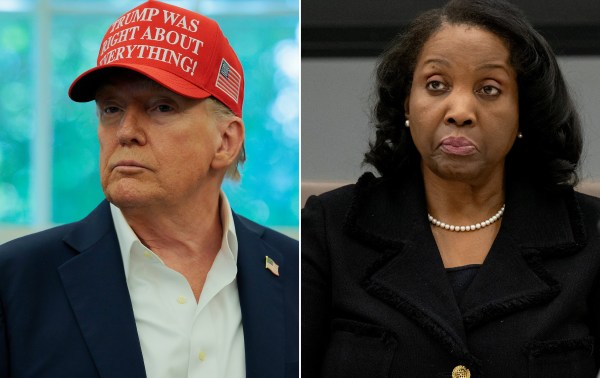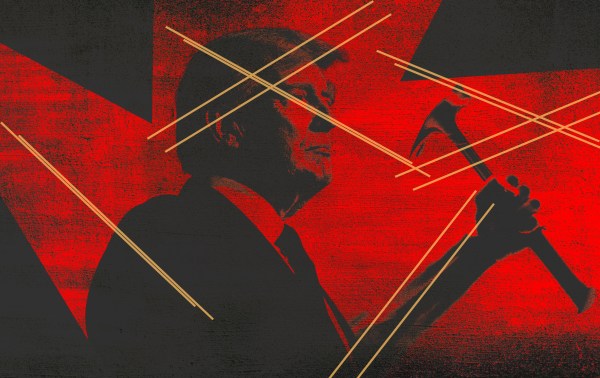The vice presidency isn’t worth a pitcher of warm spit, John Nance Garner once (almost) said. That was truer when he occupied the office 90 years ago than it is today, but everyone who’s succeeded him in the job has grappled with the fact that his or her high position involves few actual duties.
Is the president dead? Is the Senate stuck at 50-50 on any floor business? No? Well, then, you technically have the day off.
Garner probably felt more keenly than most vice presidents how irrelevant his office was. The leader under whom he served had revolutionary ideas about the breadth of executive power and moved aggressively to realize them once elected. The Roosevelt administration was monarchical, and in a monarchy no one much matters except the king himself.
J.D. Vance can relate to that. His solution to passing the time as heir apparent to King Donald is a modern one: He sh-tposts on social media. A lot.
On Monday evening Vance addressed a new scoop from The Atlantic about a rare admission of fault by the Trump administration. One of the “gang members” who was summarily deported to a gulag in El Salvador recently under the Alien Enemies Act shouldn’t have been, the feds acknowledged. Kilmar Abrego Garcia had “protected” status in the United States due to the risk that he would face harm if returned to his home country of, er, El Salvador, and in order to revoke someone’s protected status the government is supposed to go to court and explain why. Somehow Garcia, who has no criminal record in the U.S., ended up on a plane without an opportunity for a hearing due to an “administrative error.”
And no, the Trump administration’s lawyers said, there’s no way to bring him back now that he’s in the custody of another country. To quote Nayib Bukele, the dictator of El Salvador and now Garcia’s captor: Oopsie.
As outrage spread online over the story, the vice president hopped onto Twitter to make two points. First, Vance asserted, court documents show that Garcia “was a convicted MS-13 gang member with no legal right to be here”—which appears to be incorrect in all respects. He did have a right to be here, as noted, and hasn’t been convicted of anything. A government informant once accused him of being a member of MS-13, but Garcia disputed the claim and went on to receive protected status from an immigration judge.
We’re used to Trump officials displaying hostility whenever critics demand accountability from them. But it’s a new one on me to see the vice president insist that a man who was packed off to a third-world dungeon had it coming when he was sent there mistakenly by the administration’s own admission.
Vance’s second point was more interesting, however, not because it was a strong argument but because it wasn’t an argument at all. “It’s gross to get fired up about gang members getting deported while ignoring citizens they victimize,” he scolded his followers.
Although he didn’t use the word, his logic is the logic of “liberation.”
Liberation Day.
One of the ways in which Donald Trump sounds different from professional politicians is that he tends not to speak in euphemisms.
He doesn’t talk about “irregularities” in the 2020 election. He says it was rigged. He doesn’t foresee “difficulties” in trying to deport millions of illegal immigrants. He states frankly that the process will be bloody. He doesn’t hint coyly about staying in power after his term in office expires. He tells you straight up that he’s looking for loopholes in the 22nd Amendment.
That’s how he earned an unlikely reputation among his fans for being “honest.” He’s the opposite of honest, but he does often speak candidly about his intentions to a degree that’s unusual for public officials.
Another quirk of his rhetoric is that he rarely speaks about freedom.
Maybe “quirk” is no longer the right word. It was a quirk when he entered Republican politics in 2015, back when zombie Reaganism and antipathy to Democratic rule made liberty a recurring theme among Tea Party conservatives. Trump, a nationalist and an authoritarian, spoke the language of law and order instead. A decade later, Republican politics has moved considerably toward his position and away from “conservatarianism.” You don’t hear much about liberty anymore.
Until recently, that is. According to the president, tomorrow is “Liberation Day.”
“Liberation” is an uncharacteristic Trump euphemism for what would be one of the biggest (and most regressive) tax hikes in American history. The round of tariffs that the White House is expected to announce Wednesday will make foreign and domestic goods more expensive for consumers. It will upend supply chains, weaken demand for U.S. products abroad, compel bailouts of damaged industries, drive allies into the arms of enemies, and possibly trigger a recession.
Any way you slice it, that will be bad for freedom. Americans will have less freedom in making purchases, businesses will have less freedom in manufacturing products, taxpayers will have less freedom to control their own incomes, and liberal Western nations will need to be more accommodating to China’s totalitarian regime. I don’t often describe Trump administration gambits in Orwellian terms, but clubbing the global economy with tariffs and calling it “liberation” is vintage “war is peace, freedom is slavery, ignorance is strength” doublespeak.
The way the tariffs are being implemented is an additional affront to freedom. Punchbowl News reported Tuesday that “House and Senate Republicans are beginning to feel anxious about what Trump is up to,” with lawmakers as high-ranking as Senate Majority Leader John Thune still in the dark about what “Liberation Day” might bring. Their passivity is entirely of their own choosing, though: The tariff power belongs to Congress under Article I and can be reclaimed from the president by legislation at any time.
What we’re about to have in the United States is effectively taxation without representation. The executive is poised to impose a huge financial burden on the American people unilaterally because House and Senate Republicans are afraid to stop him, even though there are surely supermajorities in both chambers who regard his trade war as foolish and destructive. The point of vesting the taxation power in Congress was to give the people a chance every two years to replace those who would dare tax them; as things stand, Americans are about to be levied by a single official who’ll (hopefully!) never be on a ballot again.
The last time a monarchy slapped a tax on Americans unaccountably, Boston harbor was full of tea. If only Parliament had been clever enough to reassure the colonists that taxation without representation was a form of “liberation,” perhaps we’d be British subjects still.
War footing.
To appreciate what the Trump administration means by “liberation,” though, you’re better off focusing on Stephen Miller, the king’s immigration Nosferatu. Miller used the word no less than three times in a short Twitter screed last week about judges enjoining Trump’s enforcement policies.
“We were invaded and occupied. Entire neighborhoods were conquered. Entire towns were subjugated. … Our democracy was torn apart piece by piece,” he said of the Biden-era border crisis. “America voted for liberation [on November 5]. If every foreign trespasser gets to have their own federal trial prior to removal then there is no liberation.”
“Article 4 Section 4 requires the president to halt any invasion and no district court can override that mandate,” Miller added.
If I had to choose one piece of writing that distills everything that’s obnoxious about postliberal populism, I might choose Miller’s post. For starters, even by the standards of MAGA propaganda, the catastrophist hysteria is off the charts. Towns conquered, people subjugated, democracy torn apart: You would think you’re reading a dispatch from the Donbas, not from a rich twerp from Santa Monica.
The revanchist fervor is also overweening and true to form. Trump’s movement began as cultural irredentism for a white Christian majority anxious about losing its national pride of place to Barack Obama’s “coalition of the ascendant.” (Although, interestingly, as nonwhite blue-collar voters have moved right, the identity of that movement has become more complicated.) Miller’s post is literally irredentist. American territory was seized by an army of “invaders” and now it’s being reclaimed. Courts must get out of the way.
That’s how soldiers talk, not bureaucrats, and no wonder. Classical liberals treat politics as politics but postliberals treat it as war. That’s where the “liberation” nonsense comes from: To Trump and Miller, the populist agenda isn’t just about improving Americans’ lives, it’s about ending the supposed hegemony of enemy regimes. The president, because he’s a dope, believes that trade imbalances amount to a form of dominion exercised by other countries over the United States. Miller believes that immigrants, illegal or otherwise, constitute a foreign army engaged in “soft” occupation.
Various consequences flow from that martial attitude to politics. An obvious and convenient one is that it logically requires more authority for the president. It’s fine in peacetime to divide power between three branches of government, but when we’re “liberating” American territory from foreign control the commander in chief needs the widest possible berth legally. Authoritarians will always approach politics as battle and its leaders as field generals.
Another artifact of this war footing is that it justifies more ruthlessness than might ordinarily be acceptable. I’ve always suspected that populists are drawn to Trump less because of his policy goals than the moral license he offers to behave ruthlessly toward one’s cultural enemies but you don’t need to share that belief to see how it applies to his and Miller’s “liberation” theology. Due process and other legal niceties don’t—and shouldn’t—restrain the state’s conduct in war to the same degree that they restrain the state in peacetime. The president gets to impose crippling “emergency” tariffs and whisk immigrants off to banana-republic “black sites” without impediment because victory requires a bit of ruthlessness.
The case of Kilmar Abrego Garcia is a stark example. Deporting people erroneously and then using their absence from the country due to its own error to foreclose a judicial remedy is nothing less than the government claiming the power to exile anyone it likes. “Liberation,” in fine Orwellian fashion, functionally means that no one has rights.
The price of victory.
One more thing that follows from a martial attitude toward politics is ferocious resentment of criticism.
In politics, criticism is part of the process. In war, it’s insubordination. Politics is the art of compromise among diverse and competing interests; war is the art of rallying the people behind a single cause and marginalizing those who might undermine morale. That’s what I meant earlier about J.D. Vance avoiding arguments altogether when he wrote, “It’s gross to get fired up about gang members getting deported while ignoring citizens they victimize.” The veep isn’t joining a debate when he says something like that, he’s trying to preclude one.
Hopefully needless to say, even if Garcia were a gang member, it’s not “gross” to demand due process for an accused man and no Yale-educated lawyer would claim that it is—unless he had shifted to a war mentality in which dissenters need to be shamed and sidelined, not compromised with. Ditto for Harvard-educated Ted Cruz, who answered a question this week about due process from Bulwark reporter Andrew Egger this way: “It’s not surprising that The Bulwark’s focus is defending alleged Venezuelan gang members. … Listen, I’ve talked to too many Americans whose children were raped and murdered by these animals. You ought to be ashamed of yourself.”
Cruz has been mentioned before as a potential Supreme Court nominee. He spent his first three years as a senator positioning himself as the ultimate “constitutional conservative.” Now here he is responding to basic queries about whether it’s fair to send alleged gang members—and Kilmar Abrego Garcia almost certainly isn’t the only innocent man among them—to atrocious foreign prisons based on mere suspicion with, in so many words, “shut up.”
We’ve arrived at the point where, as Egger put it, you might ask a Republican, “Why are you calling this guy a gang member when you haven’t proven he is one?” and plausibly be told, “Why are you sticking up for a known gang member by asking me that?” That’s the logic, such as it is, of “liberationist” politics. All’s fair in love and war, and this is war.
Right-wing voters seem okay with it, though.
A recent poll found that only 15 percent of Americans and 32 percent of Republicans believe that every one of the alleged Venezuelan gang members whom Trump sent to El Salvador was actually a gang member. Even so, 51 percent of Republicans strongly approve of the Trump administration’s decision to deport them without a hearing, and another 19 percent somewhat supported it. That was no fluke either, it appears: A CBS survey released this weekend saw a dismal 29-71 split when Americans were asked if it’s acceptable or not for legal U.S. residents to be mistakenly detained by immigration authorities. But among Republicans, the split was 52-48.
Terrible mistakes are made all the time in war, you see. If your highest political priority is to inflict pain on your enemies and “liberate” yourself from their influence, you’ll tolerate the certainty of innocent people being caught in the crosshairs the same way you'd tolerate the certainty of American troops being killed by friendly fire in combat. Collateral damage, whether economic in the form of tariffs or something more literal, is a fact of life. And so, when a panelist on Fox News’ show The Five noted on Monday that one detainee in El Salvador appears to be a gay barber who was mistaken for a gang member based on his tattoos, host Jesse Watters didn’t miss a beat in replying, “It’s just a gay barber.”
It’s just a gay barber. Do you want to win this war or don’t you?
Lost somehow in the uproar over whether the detainees are who Trump says they are is the fact that, rather than merely deport them, he’s handed them over to be incarcerated indefinitely in some tinpot dictator’s prison. By what right has he done that? Why weren’t the “gang members” dropped off at an airport in Venezuela and set free? Even if they belong to a gang, what’s the criminal charge in each case that supposedly justifies imprisonment without trial?
The answer is: Shut up. Do you want to win or not?
As dark as this episode has been, it’s about to get darker now that we know of at least one detainee who was sent to Nayib Bukele’s dungeon mistakenly. Instead of bringing Kilmar Abrego Garcia back expeditiously, the administration is going to dig in—as it’s already begun to do—in claiming that there’s simply no way to get him back now that El Salvador has him.
It’s pure nonsense. The point of Trump’s foreign policy, Jonathan Last notes today, is that weak powers should do the bidding of strong ones. If Bukele doesn’t want to hand over Garcia, the president could metaphorically grab him by the lapels the same way he’s done to Greenland, Canada, and Ukraine. It’s not that Trump can’t get Garcia back, it’s that he doesn’t want him back—either because the publicity surrounding his return will destroy public support for his immigration program or, more basically, because when you’re “liberating” your country from alleged foreign hegemony the last thing you should do is return an enemy combatant to the “battlefield.”
Trump asked the right to hand him a mandate for “retribution” against his, and their, enemies by reelecting him. They complied. They wanted war. There’s no stopping now.







Please note that we at The Dispatch hold ourselves, our work, and our commenters to a higher standard than other places on the internet. We welcome comments that foster genuine debate or discussion—including comments critical of us or our work—but responses that include ad hominem attacks on fellow Dispatch members or are intended to stoke fear and anger may be moderated.
With your membership, you only have the ability to comment on The Morning Dispatch articles. Consider upgrading to join the conversation everywhere.